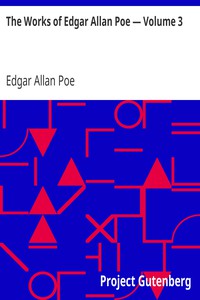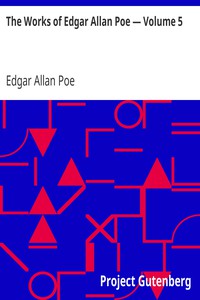The Works of Edgar Allan Poe — Volume 1 by Edgar Allan Poe (detective books to read .txt) 📗

- Author: Edgar Allan Poe
Book online «The Works of Edgar Allan Poe — Volume 1 by Edgar Allan Poe (detective books to read .txt) 📗». Author Edgar Allan Poe
“While I was busied in reflection, my eyes fell upon a narrow ledge in the eastern face of the rock, perhaps a yard below the summit upon which I stood. This ledge projected about eighteen inches, and was not more than a foot wide, while a niche in the cliff just above it gave it a rude resemblance to one of the hollow-backed chairs used by our ancestors. I made no doubt that here was the ‘devil’s seat’ alluded to in the MS., and now I seemed to grasp the full secret of the riddle.
“The ‘good glass,’ I knew, could have reference to nothing but a telescope; for the word ‘glass’ is rarely employed in any other sense by seamen. Now here, I at once saw, was a telescope to be used, and a definite point of view, admitting no variation, from which to use it. Nor did I hesitate to believe that the phrases, ‘forty-one degrees and thirteen minutes,’ and ‘northeast and by north,’ were intended as directions for the levelling of the glass. Greatly excited by these discoveries, I hurried home, procured a telescope, and returned to the rock.
“I let myself down to the ledge, and found that it was impossible to retain a seat upon it except in one particular position. This fact confirmed my preconceived idea. I proceeded to use the glass. Of course, the ‘forty-one degrees and thirteen minutes’ could allude to nothing but elevation above the visible horizon, since the horizontal direction was clearly indicated by the words, ‘northeast and by north.’ This latter direction I at once established by means of a pocket-compass; then, pointing the glass as nearly at an angle of forty-one degrees of elevation as I could do it by guess, I moved it cautiously up or down, until my attention was arrested by a circular rift or opening in the foliage of a large tree that overtopped its fellows in the distance. In the centre of this rift I perceived a white spot, but could not, at first, distinguish what it was. Adjusting the focus of the telescope, I again looked, and now made it out to be a human skull.
“Upon this discovery I was so sanguine as to consider the enigma solved; for the phrase ‘main branch, seventh limb, east side,’ could refer only to the position of the skull upon the tree, while ‘shoot from the left eye of the death’s head’ admitted, also, of but one interpretation, in regard to a search for buried treasure. I perceived that the design was to drop a bullet from the left eye of the skull, and that a bee-line, or, in other words, a straight line, drawn from the nearest point of the trunk through ‘the shot,’ (or the spot where the bullet fell,) and thence extended to a distance of fifty feet, would indicate a definite point—and beneath this point I thought it at least possible that a deposit of value lay concealed.”
“All this,” I said, “is exceedingly clear, and, although ingenious, still simple and explicit. When you left the Bishop’s Hotel, what then?”
“Why, having carefully taken the bearings of the tree, I turned homewards. The instant that I left ‘the devil’s seat,’ however, the circular rift vanished; nor could I get a glimpse of it afterwards, turn as I would. What seems to me the chief ingenuity in this whole business, is the fact (for repeated experiment has convinced me it is a fact) that the circular opening in question is visible from no other attainable point of view than that afforded by the narrow ledge upon the face of the rock.
“In this expedition to the ‘Bishop’s Hotel’ I had been attended by Jupiter, who had, no doubt, observed, for some weeks past, the abstraction of my demeanor, and took especial care not to leave me alone. But, on the next day, getting up very early, I contrived to give him the slip, and went into the hills in search of the tree. After much toil I found it. When I came home at night my valet proposed to give me a flogging. With the rest of the adventure I believe you are as well acquainted as myself.”
“I suppose,” said I, “you missed the spot, in the first attempt at digging, through Jupiter’s stupidity in letting the bug fall through the right instead of through the left eye of the skull.”
“Precisely. This mistake made a difference of about two inches and a half in the ‘shot’—that is to say, in the position of the peg nearest the tree; and had the treasure been beneath the ‘shot,’ the error would have been of little moment; but ‘the shot,’ together with the nearest point of the tree, were merely two points for the establishment of a line of direction; of course the error, however trivial in the beginning, increased as we proceeded with the line, and by the time we had gone fifty feet, threw us quite off the scent. But for my deep-seated impressions that treasure was here somewhere actually buried, we might have had all our labor in vain.”
“But your grandiloquence, and your conduct in swinging the beetle—how excessively odd! I was sure you were mad. And why did you insist upon letting fall the bug, instead of a bullet, from the skull?”
“Why, to be frank, I felt somewhat annoyed by your evident suspicions touching my sanity, and so resolved to punish you quietly, in my own way, by a little bit of sober mystification. For this reason I swung the beetle, and for this reason I let it fall it from the tree. An observation of yours about its great weight suggested the latter idea.”
“Yes, I perceive; and now there is only one point which puzzles me. What are we to make of the skeletons found in the hole?”
“That is a question I am no more able to answer than yourself. There seems, however, only one plausible way of accounting for them—and yet it is dreadful to believe in such atrocity as my suggestion would imply. It is clear that Kidd—if Kidd indeed secreted this treasure, which I doubt not—it is clear that he must have had assistance in the labor. But this labor concluded, he may have thought it expedient to remove all participants in his secret. Perhaps a couple of blows with a mattock were sufficient, while his coadjutors were busy in the pit; perhaps it required a dozen—who shall tell?”
Chacun a ses vertus.
—Crébillon’s Xerxes.
Antiochus Epiphanes is very generally looked upon as the Gog of the prophet Ezekiel. This honor is, however, more properly attributable to Cambyses, the son of Cyrus. And, indeed, the character of the Syrian monarch does by no means stand in need of any adventitious embellishment. His accession to the throne, or rather his usurpation of the sovereignty, a hundred and seventy-one years before the coming of Christ; his attempt to plunder the temple of Diana at Ephesus; his implacable hostility to the Jews; his pollution of the Holy of Holies; and his miserable death at Taba, after a tumultuous reign of eleven years, are circumstances of a prominent kind, and therefore more generally noticed by the historians of his time than the impious, dastardly, cruel, silly, and whimsical achievements which make up the sum total of his private life and reputation.
Let us suppose, gentle reader, that it is now the year of the world three thousand eight hundred and thirty, and let us,





Comments (0)